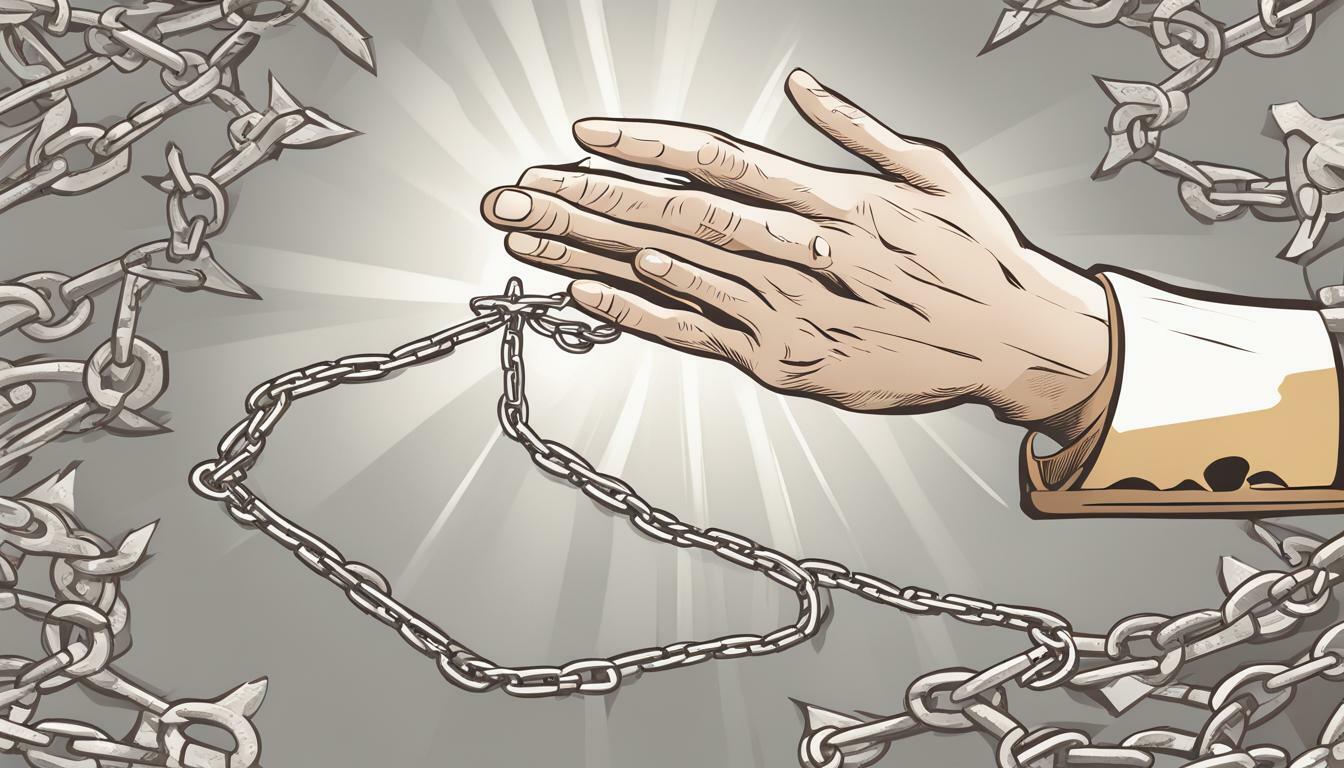Reparations have been a hotly debated topic in political and social circles in recent times. However, for those who hold religious beliefs, the Bible serves as a guiding principle for moral and ethical decision-making. In this article, we will explore the biblical perspective on reparations, examining key principles and verses that shed light on this complex issue.
Key Takeaways
- The Bible offers diverse perspectives on reparations, with different interpretations among Christians.
- Important biblical principles include the call for social justice, restitution, and forgiveness.
- Contextual analysis of biblical verses is important in understanding the relevant passages relating to reparations.
- Personal responsibility and collective repentance play a role in reparations, both at an individual and community level.
- There are examples of modern reparations movements that draw inspiration from biblical teachings.
Understanding Biblical Justice and Restitution
When considering the concept of reparations from a biblical perspective, it is important to first understand the principles of biblical justice and restitution. The Bible underscores the importance of seeking justice and making restitution for wrongdoing, particularly when it comes to the mistreatment of others.
One of the key biblical principles of restitution is seen in Leviticus 6:1-5, where it states that if someone wrongs another person, they must make restitution by repaying what they have taken or damaged, plus an additional 20% of the value. This demonstrates the importance of not only making things right, but going above and beyond to repair the harm done.
“If anyone sins and commits a breach of faith against the Lord by deceiving his neighbor in a matter of deposit or security, or through robbery, or if he has oppressed his neighbor or has found something lost and lied about it, swearing falsely—in any of all the things that people do and sin thereby— if he has sinned and has realized his guilt and will restore what he took by robbery or what he got by oppression or the deposit that was committed to him or the lost thing that he found or anything about which he has sworn falsely, he shall restore it in full and shall add a fifth to it, and give it to him to whom it belongs on the day he realizes his guilt.”
The concept of restitution also extends to situations where the wrong cannot be directly reversed, such as in cases of slavery or other forms of oppression. For example, in Exodus 21:1-11, God outlines how to make restitution in the case of a Hebrew servant who is held in slavery, noting that they must be released after six years and provided with resources to start a new life. Similarly, in Isaiah 58:6, the prophet calls for the release of those held in bondage and the breaking of every yoke of oppression, emphasizing the importance of setting things right when harm has been done.
“Is not this the fast that I choose: to loose the bonds of wickedness, to undo the straps of the yoke, to let the oppressed go free, and to break every yoke?”
Overall, the Bible emphasizes the importance of making restitution for wrongdoing and seeking justice for the oppressed. These principles are crucial to understanding the biblical perspective on reparations and can provide a foundation for further exploration of this important topic.
Examining the Context of Biblical Verses
When exploring the topic of reparations in the Bible, it is important to examine specific verses that are often cited in discussions about this controversial issue. One such passage is found in the book of Exodus, in which the Israelites were enslaved by the Egyptians and subjected to forced labor. Exodus 3:7-10 states, “And the Lord said, ‘I have surely seen the oppression of my people who are in Egypt, and have heard their cry because of their taskmasters; for I know their sorrows. So I have come down to deliver them out of the hand of the Egyptians, and to bring them up from that land to a good and large land, to a land flowing with milk and honey…'”
“When exploring the topic of reparations in the Bible, it is important to examine specific verses that are often cited in discussions about this controversial issue.”
This verse has been interpreted by some as a call for reparations, as it highlights God’s concern for the oppressed and the need for justice to be served. Additionally, the book of Deuteronomy contains several verses that address the issue of slavery and the need for restitution. Deuteronomy 15:12-15 states, “If a fellow Hebrew, a man or a woman, sells himself to you and serves you six years, in the seventh year you must let him go free. And when you release him, do not send him away empty-handed. Supply him liberally from your flock, your threshing floor and your winepress. Give to him as the Lord your God has blessed you.”
These verses illustrate the concept of restitution in the Bible, which is closely tied to the idea of reparations. They emphasize the importance of providing compensation to those who have been wronged, and serve as a reminder of God’s concern for the marginalized and oppressed.
Interpretation and Context
However, it is important to note that not all Christians interpret these verses as a call for reparations. Some argue that the historical context of these passages must be taken into consideration, and that the biblical concept of restitution is not necessarily equivalent to modern-day reparations.
Additionally, there are diverse opinions regarding the interpretation of other biblical passages related to reparations and restitution. For example, some Christians point to the book of Philemon as evidence of a biblical precedent for reparations. In this book, Paul encourages Philemon to welcome back his runaway slave Onesimus as a brother in Christ, and to forgive any debt owed by Onesimus. Some interpret this as an example of reparations, as Philemon is essentially being asked to compensate Onesimus for his past mistreatment.
Overall, the interpretation of biblical passages related to reparations is a complex issue that requires careful consideration of historical context and diverse theological viewpoints. However, it is clear that the Bible emphasizes the importance of justice and restitution, and provides guidance for how individuals and communities should respond to past wrongs.
The Call for Social Justice in the Bible
When examining the biblical perspective on reparations, it’s crucial to consider the overarching theme of social justice in the Bible. Throughout the Old and New Testaments, there are numerous verses that speak to the importance of caring for the marginalized and oppressed.
One such passage can be found in Isaiah 1:17, which calls for people to “seek justice, correct oppression; bring justice to the fatherless, plead the widow’s cause.” This verse highlights the biblical view that it is the responsibility of individuals and communities to advocate for justice and care for those who have been victimized.
In the New Testament, Jesus himself advocates for social justice, speaking out against oppression and advocating for the poor and marginalized. In Luke 4:18-19, Jesus quotes the prophet Isaiah and says, “The Spirit of the Lord is upon me, because he has anointed me to proclaim good news to the poor. He has sent me to proclaim liberty to the captives and recovering of sight to the blind, to set at liberty those who are oppressed, to proclaim the year of the Lord’s favor.” This verse highlights the importance of addressing oppression and advocating for the marginalized, further emphasizing the biblical view on reparations as an act of justice.
Overall, the call for social justice in the Bible provides a compelling framework for understanding the importance of reparations. By advocating for justice and caring for those who have been victimized, individuals and communities can take important steps towards healing and reconciliation.
The Principle of Forgiveness and Reconciliation
The concept of forgiveness and reconciliation is central to the Bible’s teachings. In the Old Testament, God forgave the Israelites time and time again, even when they rebelled against Him. In the New Testament, Jesus Christ urged His followers to forgive not just seven times, but seventy-seven times.
However, forgiveness does not mean that justice should not be served. In fact, biblical justice demands that wrongs be righted and restitution be made. In the case of reparations, the principle of forgiveness and reconciliation can be seen as a necessary step towards healing and restoration.
One relevant Bible verse that highlights the importance of forgiveness in the pursuit of justice is found in Matthew 6:14-15: “For if you forgive men their trespasses, your heavenly Father will also forgive you. But if you do not forgive men their trespasses, neither will your Father forgive your trespasses.” This verse emphasizes the reciprocal nature of forgiveness, and how refusing to forgive can have negative consequences.
“Forgiveness is not an occasional act, it is a constant attitude.” -Martin Luther King Jr.
At the same time, the Bible also emphasizes the importance of repentance and restitution. In the case of reparations, this means that individuals and communities must acknowledge and take responsibility for past wrongs, and work towards making amends. This can be seen in the story of Zacchaeus in Luke 19:8, where he promises to give back four times what he had taken as a tax collector.
Overall, the principle of forgiveness and reconciliation is an important aspect of the biblical perspective on reparations. While forgiveness is essential, it should not be used as an excuse to ignore past wrongs or avoid making restitution. Instead, it should be seen as a necessary step towards healing and restoration, and a way to move forward towards a more just and equitable society.
Diverse Interpretations within Christianity
The topic of reparations has been a subject of debate and discussion within Christianity, with diverse interpretations among theologians and scholars. While some argue that reparations are necessary to address historical injustices, others believe that it may perpetuate the cycle of victimhood and lead to further division.
Despite the differing opinions, there are biblical teachings on reparations that can be drawn upon for guidance. The Bible emphasizes the importance of restitution, which involves restoring what was taken or lost. In Exodus 22:1-15, it is stated that if someone steals from another person, they must pay back what was stolen and additional compensation. Similarly, in the book of Leviticus, there are instructions for making restitution for wrongdoing.
“If anyone sins and does what is forbidden in any of the Lord’s commands, even though they do not know it, they are guilty and will be held responsible. They are to bring to the priest as a guilt offering a ram from the flock, one without defect and of the proper value. In this way, the priest will make atonement for them for the wrong they have committed unintentionally, and they will be forgiven.” – Leviticus 5:17-18
However, there are also verses that suggest forgiveness as a key principle in seeking justice. This is exemplified in Jesus’ teachings on forgiving others, even those who have wronged us.
“But I tell you, love your enemies and pray for those who persecute you, that you may be children of your Father in heaven. He causes his sun to rise on the evil and the good, and sends rain on the righteous and the unrighteous.” – Matthew 5:44-45
The concept of reparations, therefore, is complex and multifaceted, with varying interpretations and applications within Christianity. It requires a nuanced understanding of biblical principles on restitution, forgiveness, and justice, and a dialogue among individuals and communities to find a path forward that promotes healing and reconciliation.
Applying Biblical Principles to Modern Reparations Movements
While the concept of reparations has historical roots, modern movements advocating for reparations have drawn inspiration from biblical principles. By examining the biblical view on reparations, these movements have been able to ground their arguments in a faith-based perspective.
One such organization that draws on biblical teachings to support reparations is the National African American Reparations Commission (NAARC). The commission, citing Deuteronomy 15:12-15, argues that reparations are a “moral and spiritual imperative.”
“If any of your people—Hebrew men or women—sell themselves to you and serve you for six years, in the seventh year you must let them go free. And when you release them, do not send them away empty-handed. Supply them liberally from your flock, your threshing floor and your winepress. Give to them as the Lord your God has blessed you. Remember that you were slaves in Egypt and the Lord your God redeemed you.”
The principles of justice and restitution outlined in this passage have been central to the NAARC’s calls for reparations. By highlighting the need to provide for those who have been oppressed and enslaved, the organization is able to make a compelling case for reparations that is grounded in biblical teachings.
Another example of a modern movement that uses the Bible to support reparations is the Ecumenical Reparations Initiative (ERI). The ERI, which is made up of faith-based organizations, is dedicated to advancing the cause of reparations from a faith-based perspective.
The ERI draws on Luke 4:18-19, in which Jesus announces his mission to “proclaim good news to the poor” and “set the oppressed free.” The organization argues that advocating for reparations is consistent with Jesus’ mission of social justice and the pursuit of equality.
By grounding their advocacy in the Bible, these organizations are able to give their calls for reparations a powerful moral and spiritual grounding. They are able to appeal to religious communities and individuals who may be hesitant to support reparations based on political or social arguments alone.
The Role of Personal Responsibility and Collective Repentance
When it comes to the issue of reparations, biblical principles on reparations stress the importance of personal responsibility and collective repentance. The biblical view on reparations acknowledges that the sins of the past can still impact present-day communities and individuals, and that addressing these issues requires not just a financial commitment, but also a commitment to personal and communal repentance.
One of the key Bible verses that highlights the need for personal responsibility is found in the book of James, where it says, “Therefore, confess your sins to one another and pray for one another, that you may be healed” (James 5:16). This verse emphasizes the importance of acknowledging and repenting for past wrongs in order to move forward in healing and reconciliation.
However, personal responsibility alone is not enough. Collective repentance is also required in the context of reparations. In the book of Nehemiah, the Israelites repent for their collective sins, acknowledging the wrongs committed by their ancestors. They say, “We have acted very corruptly against you and have not kept the commandments, the statutes, and the rules that you commanded your servant Moses” (Nehemiah 1:7). This example highlights the importance of acknowledging the collective responsibility for past injustices, and the need for collective repentance and restitution.
“The biblical view on reparations acknowledges that the sins of the past can still impact present-day communities and individuals, and that addressing these issues requires not just a financial commitment, but also a commitment to personal and communal repentance.”
Furthermore, the biblical view on reparations emphasizes that this process of repentance and restoration is not just a one-time event, but an ongoing process. In the book of Amos, God instructs his people to “let justice roll down like waters, and righteousness like an ever-flowing stream” (Amos 5:24). This verse highlights the need for ongoing commitment to justice and righteousness, indicating that the process of seeking reparations is a continual one.
Overall, the role of personal responsibility and collective repentance is integral to understanding biblical principles on reparations and the biblical view on reparations. The Bible highlights the importance of acknowledging and repenting for past wrongs, both individually and collectively, as part of the process of seeking justice and restoration.
Conclusion
Exploring the biblical perspective on reparations is a complex and nuanced topic, with a variety of viewpoints and interpretations within Christianity. Throughout this article, we have examined the concept of biblical justice and restitution, analyzed specific verses in their historical context, and explored the theme of social justice in the Bible. We have also discussed the principles of forgiveness and reconciliation, the diverse interpretations within Christianity, and the role of personal responsibility and collective repentance in the context of reparations.
It is clear that the Bible has much to say about seeking justice for historical wrongs and caring for the marginalized and oppressed. While there is ongoing debate and discussion about the specific application of these principles to reparations, it is important to approach this topic with humility, openness, and a willingness to listen to diverse perspectives.
Further Exploration and Application
If you are interested in further exploring the biblical perspective on reparations, consider reading relevant Bible passages and consulting commentaries and theological works. Additionally, you may find it helpful to engage in dialogue with others who hold different viewpoints, sharing experiences and insights in a spirit of mutual respect and learning.
As we seek to apply biblical principles to contemporary issues of justice and reconciliation, may we be guided by the teachings of Jesus, who calls us to love our neighbor as ourselves and work for the flourishing of all communities.




